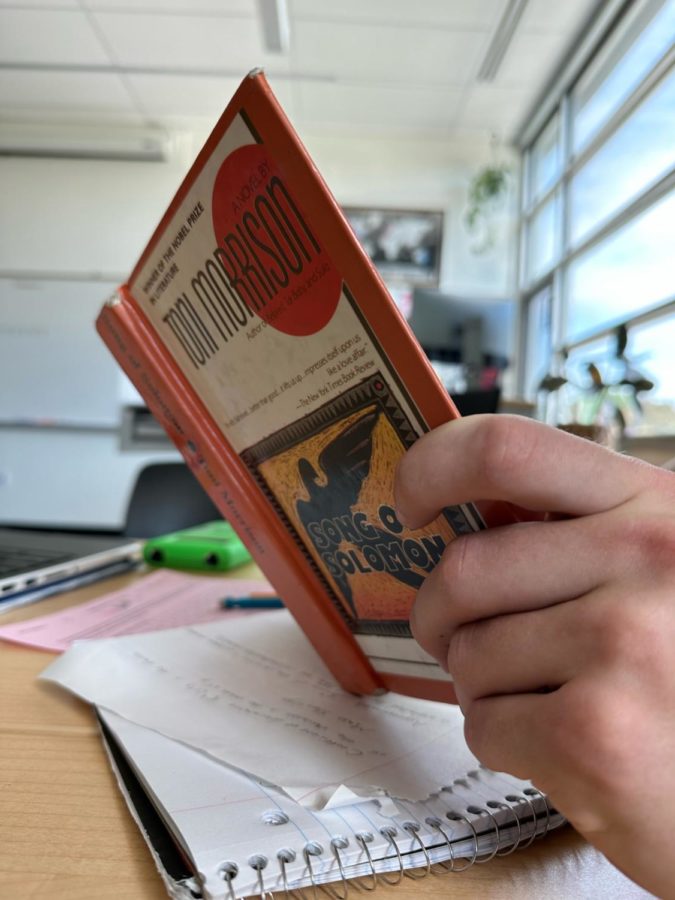Canby’s Book Ban
A student at Tigard High reads “Song of Solomon”, a book banned in many schools across the country.
May 16, 2023
On the night of April 10, Canby’s school board met to discuss the removal and review of 36 books, which were marked for ‘explicit content’. In a series of bureaucratic meetings, discussions were held, with many upset parents. Outside, there was a series of protests by a group of even angrier students, with signs calling for people to “read banned books”.
In the list of banned books, there were an overwhelming number of books discussing sexual assault, topics on race relations, books with prominent LGBTQ+ characters, and sexual conduct. The list of books that were removed covers a large topic from comic books like Heartstopper Vol 1, to classics, such as The Handmaid’s Tale by Margaret Atwood (another book which is assigned to students at Tigard).
One of the parents, Nicole Cole, requesting the book ban, testified, “Some of these books, as I got into them, have really explicit sex.”
When looking over the reading requirements for Canby, many students in the AP Literature class are required to read Hamlet, a book students at Tigard have read. I find this deeply ironic because Hamlet has significantly more references to sex, incest and other mature content compared to Looking For Alaska, which was banned for one specific paragraph alluding to sex. Although Hamlet is written in old English, when Shakespeare wrote the play he intended for those lines to carry strong sexual innuendos and include ‘dirty humor’, and when students analyze these lines, it’s clear to see the intention. However the main differences between the banned books and the later, were the diverse content matter and books written by diverse authors.
Zachary MacDuff, a senior at Candy high school testified, “It is no coincidence that most of these books are dealing with these subject matters. Minority communities are being threatened.”
One of my all-time favorite books is The Namesake by Jhumpa Lahiri. This novel goes through the immigration story of a first-generation Bengali-American family, and the intergenerational culture shock experienced when moving from Kolkata. It was the first time in an academic setting that my culture was truly recognized. The pages were heart-wrenching, melancholic, and reminiscent of some of the worst experiences my family has gone through, and perfectly captured the joy of being raised in a Bengali family. It pains me to think about all of the students in my shoes who can’t read that book, because it was banned by a school district (although not Canby SB) who probably never even read the entire novel.
Students have begun organizing against these attacks, and have started an Instagram account called @donottakemybookschs, which has been vocal about the actions in Canby.
In a statement given by Jason Hupp, a senior at Canby, he says, “We are living in very hard times that are becoming more and more dystopian as the days pass […] Many of these books have topics of dismantling dystopias and taking down the people who have done them wrong […] The people in charge who pass the laws and ignore the true problems of the nation are worried we’re [going] to do something about it.”
Hupp reviewed the equity policies adopted by the school district and said, “The parents that had removed these books claim that not all students can handle such intense reading material.. That itself is inhibiting students who are more inclined to reading or comprehension because now we are no longer allowed to read books that will challenge their ideas and expand their knowledge”.
The mission statement adopted by the Canby School District reads, “The district’s foundational beliefs are that each student can reach their full potential, that our diversity is an asset and equity is at the core of our mission”. With that being said, we must ask them, are they truly believing that all students can reach their full potential? Is taking away certain perspectives and under-represented stories an asset and equity centered? I would argue that they failed.










